Blog Archives
January 30, 2001 
Gurudeva continues on his editing work for Living with Siva, the "Sutra section." The Nandinatha Sutras outline a code of conduct for Hindus on the path of spiritual transformation and also document many of the unwritten traditions of Hindu culture. In the yoga system the first two limbs, the foundations for spiritual practice are called the "Yamas and Niyamas" which could be broadly termed as 20 guidelines for "Right Living." The 365 daily sutras elaborate on "right living" in all areas of life. Only on this foundation can any yoga practice be successful.
|
Title: Pictures of God; Adultery |
Cybertalk: Rajendra Giri from Colorado asks if it is alright to have pictures of Gods in different rooms in the house. Gurudeva says it is fine and that we must be reminded of the Gods in any place and at all times. A cyber cadet in Kuala Lumpur wonders about adultery. Gurudeva says that adultery breaks up the family and penance of an extreme nature can balance the currents of the body and if the wife forgives perhaps the sin can be mitigated.
Cybertalk Ends"
For more information about listening to Gurudeva's talks online and to hear them in other formats, click here.
Do you have questions for Gurudeva? Send to questions@hindu.org.
Please note: Gurudeva only responds to questions from the general public on matters that are suitable for our public cyber audience. Personal or intimate questions sent to this address are not answered.
A detailed index of past inspired talks is available here.
transcription begins
Transcription of One of Gurudeva's CyberTalks
Date: January_26_2001
Title: Retreat after Death
Category: Hinduism and Tradition
Duration: 1 min., 51 seconds
Date Given: January 21, 2000
A cyberspace devotee, Claudia asks the same question, "My mother passed away in December. But I've been meditating in our shrine room. Why is this a problem during the 31-day period?"
This is the third question that has come in today on the same subject and we are sending all three of you a chapter of the new book 'Living with Siva', that we were doing the final editing on as you were writing these questions. This is very unusual. We are sending this to you on e-mail.
Yes, meditation is just fine during this 31-day period. However, you don't want to perform arati, perform pujas, go to the temple, and visit holy personalities. You just want to go within yourself and adjust your new life, knowing that your mother is having a wonderful time in the inner worlds. Also, knowing that you have to make an adjustment to the loss of your loved one.
I might add that traditional Hindus won't even enter the shrine room during this 31-day period. They would perform their meditation in another room within the home.
We are e-mailing this chapter about the 31-day period between birth and
death from the new book, 'Living with Siva', to these three cyberspace
cadets. Anyone else who would like to receive it, please write to
questions@hindu.org
. We would be very happy to e-mail it to you too.
transcription ends
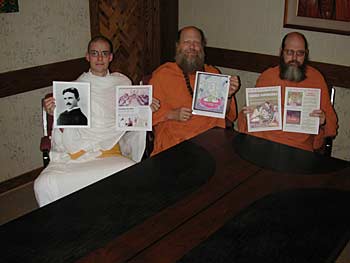
The Hinduism Today editorial team is having their mid-cycle "JAZZ week" for the next issue of Hinduism Today. This means as of the end of the day, half of the articles for the coming issue will have been completed, proofed by two persons, read by Gurudeva and all the Acharyas and "in the box." We called it "JAZZ week" because we used to download all the articles on to a JAZZ cartridge and mail to the printer. Now we send it all over the internet, but the name stuck and lives on. Here are articles and resources for the coming May-June issue of the magazine. On the left, Sadhaka Jivanandanatha with a picture of Nicola Tesla, who will be featured in this issue, along with an article about a hindu religious school for the blind. . .in the middle Sivakatirswami with art work for the "Vedas" page and Arumugaswami our managing editor on the right with the insight section on Samskaras.
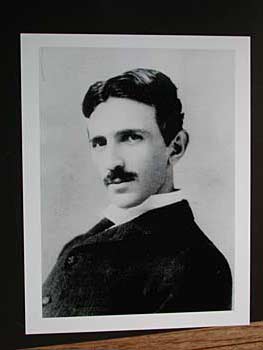
Why feature the great electrical wizard and inventor? Well, Tesla was influenced strongly by Swami Vivekananda and you wouldn't even be looking at TAKA today, were it not for Tesla's inventions!
It is said by the devas as revealed to Gurudeva in the "Lemurian Scrolls"
"The dawn of Sat Yuga will begin when man is able to light the night with his own devices."
History books tell us that Edison invented the light bulb, but the true master of electricity was Tesla who invented among other things, Alternating Current (AC) which enabled electricity to be transmitted over long distances, AC generators, the most common AC motor used today (like in your blender!), radio (it was not Marconi. . .) , remote controlled devices, the first x-ray pictures, the Tesla coil used in the CRT tube of the monitor you are using to view this page and much, much more. Tesla lived from 1856 to 1943. The world would not be what it is today without him. Stay tuned for the article in Hinduism Today.
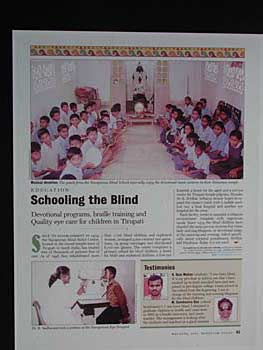
A wonderful article on a blind school.
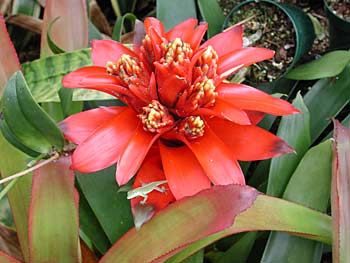
Sadhaka Jivanandanatha is traveling to Singapore, Malaysia and Mauritius for a short mission with Sannyasin Yoginathaswami. So, in his absence our art director Sannyasin Natarajaswami will be getting some experience with our digital camera. . .with a little guidance from Sadhaka Jivanandanatha, swami practiced on floral close-ups today.

The "inflourescents" of the bromeliads are rare and remarkably structures, not really flowers as such, the actual flowers will be found inside the structures.

The real flower here is the little orange bud peaking out.
![]()
An eleven acre site in Bangalore, India, where 75 Indian families live and daily carve the sacred white granite edifice of Iraivan Temple which will soon begin to be assembled on the island of Kauai
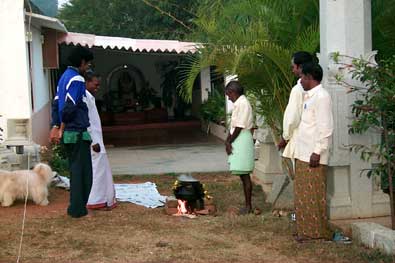
Our "Pongal Festival" celebration story goes on. . .early in the morning before dawn a fire is lit and the famed "Pongal Pot" is prepared, just outside the shrine at the Bangalore carving site.

Stoking the fires for the Pongal Pot. Pongal means sweet rice.
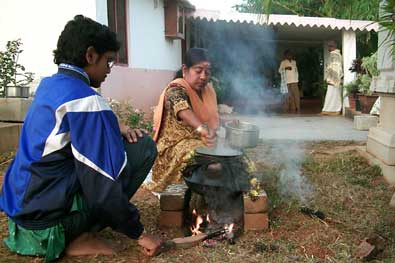
Kanmani brings the rice and now everyone will watch carefully. . . .
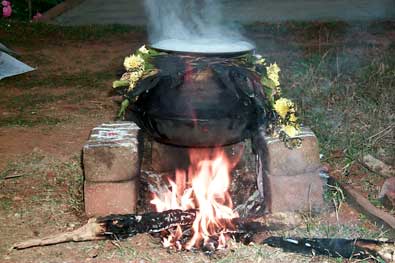
The rice is left to boil and the direction where if over flows the pot is an augur of great significance.

Meanwhile the sun finally rises, sending a rare of warmth to cut the chill in the high plateaus of Karnataka
Click here to view this day last year.
"How to Become A Hindu"! Gurudeva's latest book release is now available Hot Off the Press! Visit the Himalayan Academy Book Store Web Site get the book and read the incredible testimonies of the early pioneers from the west who chose to make a full and complete conversion to Hinduism, legally change both their first and last names to Hindu names, change their lifestyles, sever their formal connections to previous faiths and joyously face the challenges in joining the tribe of the Sanatana Dharma
Visiting Kauai's Hindu Monastery
If you are planning to visit Kauai, please go first to our our visitor's page. Thank you.
Click here for information about Gurudeva's travels. He is presently staying on Kauai and has not immediate travel plans.
And
12 Glorious Days, 8 Enchanting Countries
and One Chance in a Lifetime!
Imagine spending 12 days with one of the greatest spiritual leaders of this century. Satguru Sivaya Subramuniyaswami will be leading this exotic educational and spiritual voyage himself combining the mystical path of Indian spirituality with a superlative retreat from it all.
Take advantage of this one chance to be in close proximity with a living master. Come with us on an inner and outer voyage to Northern Europe and Russia.
www.innersearch.org
SIGN OUR GUESTBOOK AND RECEIVE A FREE GIFT
Sign our guestbook and we will send you a free issue of our global full-color bi-monthly magazine, Hinduism Today.
THANK YOU, GURUDEVA
For those who have been touched spiritually by Gurudeva's work, his books, his guidance, his inspired life and example and even his website, the "Thank You, Gurudeva Fund" has been established within Hindu Heritage Endowment.
Proceeds from this fund last forever; they're not a one-time gift. So gifts to this fund have eternal gratitude built into them. They live on in perpetuity.
Each month Gurudeva receives the income from the fund to be used at his own discretion to promote his work and mission around the globe. He loves this, for he knows that it comes from all the good souls who have met him and studied with him, traveled with him or just talked with him over the years. A contribution to this fund is tax-deductible.
